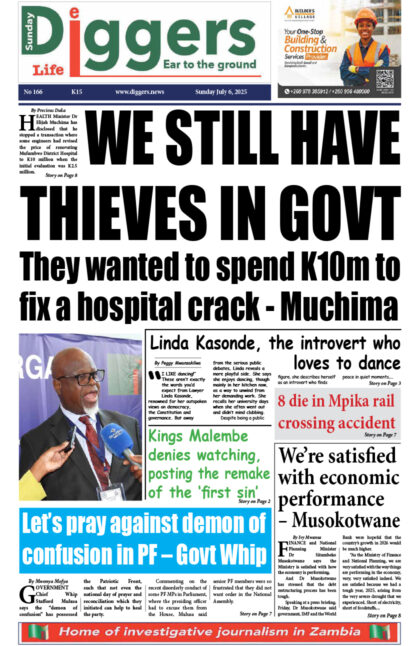Justice Minister Given Lubinda says the obligation to pay back money accrued from illegally staying in office after the dissolution of parliament in 2016 lies in the hands of individual ministers.
And Lubinda says the parties involved in the matter before the Constitutional Court have not yet agreed on the quantum or what needs to be repaid, which is why the Attorney General has applied to the court for assessment of the cost.
Speaking when he rendered a ministerial statement in parliament, Tuesday, Lubinda said it was only the Attorney General through the debt collection unit under his ministry which was mandated to execute court orders like the one in question.
“The court order was to the effect that the ministers who remained in office prior to the 2016 general elections pay back the emoluments that were paid back to them during the time when the National Assembly had been dissolved. Mr speaker, following my statements on the media clarifying the position on the repayment of money paid to individual ministers as a result of the judgement of the constitutional court, there have been numerous questions posed both inside and outside the house. Mr speaker, the Attorney General through the debt collection unit in the Ministry of Justice is the institution that is mandated to execute such orders. It is therefore the duty of the Ministry of Justice to execute the court order. As such, in its quest to execute [or] collect the money from the second to the 64th respondents , the state through the learned Attorney General applied to the Registrar of the Constitutional Court for assessment in accordance with the court order as stated earlier,” Lubinda said.
“This is in order to determine what specific monies are liable to be paid back to the state by the affected 64 respondents. The obligations to pay back the money, therefore, rests on the individual respondents. Mr Speaker, the fact that the court identified the need for parliament to amend the constitution means that there is a problem with the provisions of the Constitution that need to be addressed. For emphasis, following the judgement of the constitutional court in August 2016, and three years down the line, the parties involved in the matter before the Constitutional Court have not yet agreed on either the quantum or what needs to be repaid. It is in this regard that the state directed the learned Attorney General to apply for assessment for the amounts to be repaid. This is because the state respects the ruling and the finding of the court.”
And Lubinda said it was the constitutional responsibility for all the affected ministers and former ministers to uphold and defend the law.
“I wish to further emphasis on behalf of all the respondents in this matter that it is our constitutional responsibility to uphold the law and defend the constitution of Zambia. It is also the duty of the executive to ensure that court orders are respected by all citizens of the country,” Lubinda said.
And asked by Monze Central member of parliament Jack Mwiimbu on whether or not the cited ministers would pay back, Lubinda said the question was beyond his capacity and that he was not the lawyer to the responded ex-ministers.
“My statement was meant to be crystal clear as I could ever make it. And I indicated that the Ministry of Justice through the debt collection unity of the ministry is the one that is responsible for executing such orders. And the reason why learned Attorney General applied to the Constitution Court is in keeping with the ruling of the Constitutional Court that in the absence of an agreement being arrived at on the quantum to be paid, either party may approach the Constitutional Court Registrar for assessment. What is that assessment for? [It is] for the execution of the order. So, to ask me whether the individual respondents will pay is a matter beyond my capacity to respond to. I am not their lawyer [but] I am minister of Justice, responsible for collecting such debt. That is my job,” responded Lubinda.


















